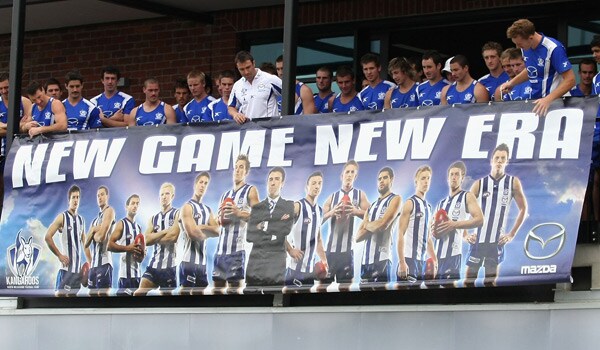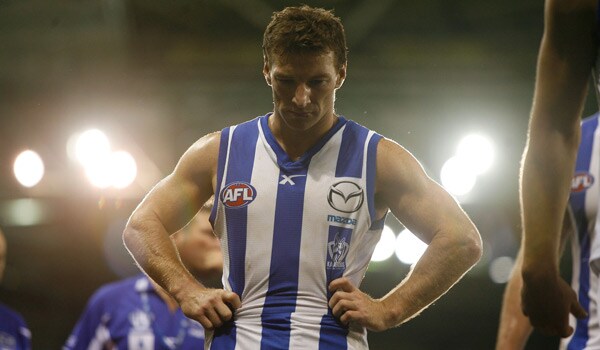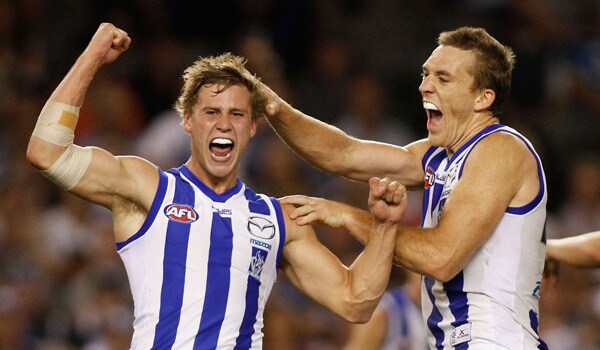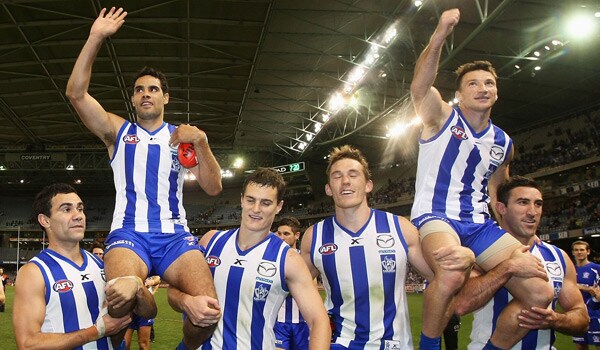Only six individuals have coached 100 games at the North Melbourne Football Club. On Sunday against Richmond, Brad Scott becomes the seventh.
NMFC.com.au caught up with the senior coach to look back at key moments in his tenure and how they coincided with his philosophy.
It all started before his first game at the helm. The task of appointing the then caretaker coach as a senior assistant was a tricky one, but something Scott felt was of vital importance.
"The first task that I had when I was appointed at North Melbourne was to make sure we secured Darren Crocker," Scott explained.
"He was already an assistant but we had to make sure he stayed on. It was just so important to have someone who knew the players better than I did (when I started). Crock applied for the position (senior coach), he was the caretaker coach and he's still been unbelievable for me in terms of his loyalty.
"He puts his own ambitions to the side to do what's best for the football club. He has really led the way for me in terms of being very loyal, making sure the coaches understand my message, reinforcing my message to the players.
"With an able and loyal assistant like that, coaching the other coaches and indoctrinating them into my own philosophy has been made so much easier."

With a 33-year-old coach at the helm, things were going to be different than usual at Arden Street. Right from the beginning, it proved evident.
Very few coaches would have ever wished for a longer pre-season but if Scott was offered it in 2010, he would have jumped at the opportunity.
Going into the season-opener, the rookie coach was nervous.
"I had a feeling that pre-season that we had a lot of things we were trying to implement and not a lot of time to do it.
"A lot of pre-seasons you refer to them being long and arduous, but for me in that first pre-season I couldn't find enough hours in the day. There was a fair amount of trepidation going in."
Faced with a trip to AAMI Stadium to face Port Adelaide in Round 1, North fell behind early. Entering the rooms at half-time, Scott and his men were on the wrong end of a 44-point deficit.
Looking back on it now, the coach can see the positives in both the first half and the second. North whittled the deficit down to just 14 at full-time, after adjustments were made.
"I can honestly say every game I've coached you come up with a plan and if you can execute that plan you win. It was a really good baptism of fire because the plan we went in with didn't work.
"Right from the opening bounce we were under a lot of pressure. We had to change things completely at half-time which is what senior coaching is all about.
"You can prepare all you like but being able to think on your feet and make some changes is important. We were really disappointed to lose that game but after it I was heartened by the fact that the things we altered worked and we almost pinched it in the end."
While there were promising signs on-field in game number one, it was the complete opposite the following week.
In Scott's first game in Victoria, North was comprehensively beaten by a rampant St Kilda outfit at the peaks of its powers. A scoreless first quarter meant a 49-point deficit and by the final siren the margin had swelled to 104.
A triple-figure loss ended up being a defining moment.
"We knew we were playing a really good side. We got absolutely obliterated.
"I've quite often said that subsequent to that loss it was my proudest moment as senior coach. We could have easily panicked.
"The club must have thought at various stages, 'we've just appointed a 33 year old, inexperienced senior coach and we've just been beaten by 104 points in Game 2 after losing the first game.'
"We were really steadfast in what we were doing and we didn't waiver in the belief we were going about things the right way.

"We learned some really harsh lessons. Boomer was kept to five possessions and then the next week he had it 44 times. We bounced back and that's how as a coach, you know you've got players of really good character."
After heavy losses, teams can often go one of two ways. The large defeat can send them into a tailspin with lack of confidence affecting on-field play.
But it can also be the reality check needed to turn things around. That argument has been a mark of Scott's time at North Melbourne; despite suffering some heavy defeats, North has bounced back the following week on almost every occasion.
While Scott's reactions have the cameras fixed on the coaches box, it's the removal of emotion which can prove vital in rebuilding shattered morale.
"You focus on the facts. After a loss like that (against St Kilda), players are shell-shocked. Even if you asked them what happened, they probably couldn't articulate it very well because they're still in a state of shock.
"My first job is to strip it back and show them what happened and why, then give them a direction and what we have to do to rectify that.
"That's always the starting point and once you've done that you go about building back up the morale and confidence. You can't just speak in intangibles.
"The easiest thing to do after a loss like that is to spray the players and abuse them for lack of effort and not trying hard enough. It's just not true.
Even in that review of the St Kilda game, it wasn't through a lack of effort; it was a lack of execution and a lack of system."
Games against St Kilda have often provided key moments during Scott's tenure. An often forgotten game against the Saints occurred half-way through the 2011 season.
While most remember the late-season clash, marked by Jack Ziebell's three week suspension for striking Nick Riewoldt, the mid-season game was perhaps more noteworthy in the evolution of the team and the coach.
Trailing by 19 points at the final change, North spent the entire last quarter peppering away inside the 50. In response, St Kilda parked countless loose men behind the ball. It lead to the bizarre spectacle of no Saints' players forward of the defensive 50 for minutes at a time.
"What happened in that game is we got close and St Kilda went into defensive mode to try and save the game," Scott explained.
"We really felt that if we attacked enough the dam wall would break and we'd be able to score. We had enough shots at goal to win the game but we missed them.
"It was a great example of how you can make changes from the box, but it's still very difficult to get 22 players on the same page from the coaches box. It was another learning curve for me to expect the unexpected and prepare for anything.
"Composure is something that usually comes with experience. It's very rare to find young players who are really composed. It not only comes from the experience of playing games, but experience on the training track.
"Again it was a harsh lesson, but a good lesson."
Scott's first two seasons at North resulted in finishes just outside the top eight. 2012 was a turning point, and the first glimpse came early in the season.
In 2010 and 2011, the Kangaroos had lost twice to Geelong by a combined total of 101 points. In Round 3, 2012 at Etihad, North ran the Cats off their feet en-route to a stunning 17 point victory.

After two years of heavy losses to top four teams, it was the first inkling of what this outfit was capable of.
"We went into the season with real optimism," Scott said, looking back.
"Last season (2011) we'd beaten the sides that were around about where we were, but we really wanted to attack the good sides and show our best football was capable of competing with the best.
"I suppose that was a bit of a breakthrough for us that night. Geelong were - and are - an unbelievable footy side, reigning premiers at the time.
"It was another step in building the self-belief, because that's the only way you can build it. You can't just go from having no self-belief to winning, you've got to build it in small incremental blocks.
"I felt we'd been doing that and in a way that was vindication for what we had been doing."
The next two months were marred by inconsistency, but the second half of 2012 produced some of the best football seen at Arden Street in many, many years.
10 wins in 12 games took the football world by storm and sent North rocketing up the ladder. Internally, Scott was focused on keeping the playing list level-headed, not buying into the hype.
"It's about showing the players why (the winning streak was happening). Facts are really important in footy because there are so many intangibles in our game.
"There's such heavy media scrutiny, there's so many people that have opinions. The vast majority of those opinions are based on little fact - that's not a negative comment - but after a while if those opinions are reinforced enough it can appear to be fact. That's as much for when you're winning as when you're losing.
"We were really conscious of why we were winning and what was making us a competitive side. We were also conscious that even in those wins we had a lot of work to do."
The momentum had begun to peter out slightly after a finals appearance was booked. A last quarter fade-out against Fremantle was followed by an uninspiring victory against Greater Western Sydney in the final round of the home and away season.
As Scott reflected, it may have been a classic case of the team peaking too early.
"The week before (the final), we played GWS in what was essentially a dead rubber. We looked at resting a whole lot of players.
"We took the attitude that we'd got to that point by going 100 per cent both on the training track and in games, and we were going to continue that way.
"In hindsight we went over to Perth in 35 degree heat and the players had expended so much energy just trying to get there. It seemed like we had seven or eight elimination finals in a row before that final.
"We knew we were going to give absolutely everything out there and if we fell short, then we fell short. Unfortunately on the day we fell way short."
A common thread throughout Scott's comments has been a focus on the facts and processes required to win games of AFL football.
In 2013, that took a slight back seat when Brent Harvey and Daniel Wells played their 350th and 200th games respectively.
Against St Kilda, it was one of the biggest milestone days in recent history for the club.
 |
"It's important to recognise your champions and your big milestones. I always bring it back to the team.
"Our guys are fantastic like that. The players want to win the game for the milestone player, but most importantly the player whose milestone it is wants to make sure he doesn't let the team down.
"They're (Harvey, Wells) the two players that have carried a lot of the burden over the years for the club. There's an enormous expectation on them to play well and help us win.
"I've tried to lessen the load on those guys. I still think they carry enormous responsibility but rather than being a team that needs those two to dominate games for us to win, we can be a team where those guys do what they do and the rest of the team does their job and we win.
"They've been unbelievable and they'll go down as all-time greats of the club. Sometimes you do have to take a step back from the facts and the process and acknowledge we are fortunate to have these guys play for our football club.
Four and a half years after his first senior game, Scott is about to coach his 100th game at the relatively young age of 38.
Looking back on how he's grown in the job, it's evident he is aiming to be in coaching for the long haul.
"I'm an infinitely better coach now than I was five years ago," Scott added.
"That in itself can only come through experience. I'm still only young, I've just turned 38. I've got an enormous appetite for the job and I'm fully immersed in it."


